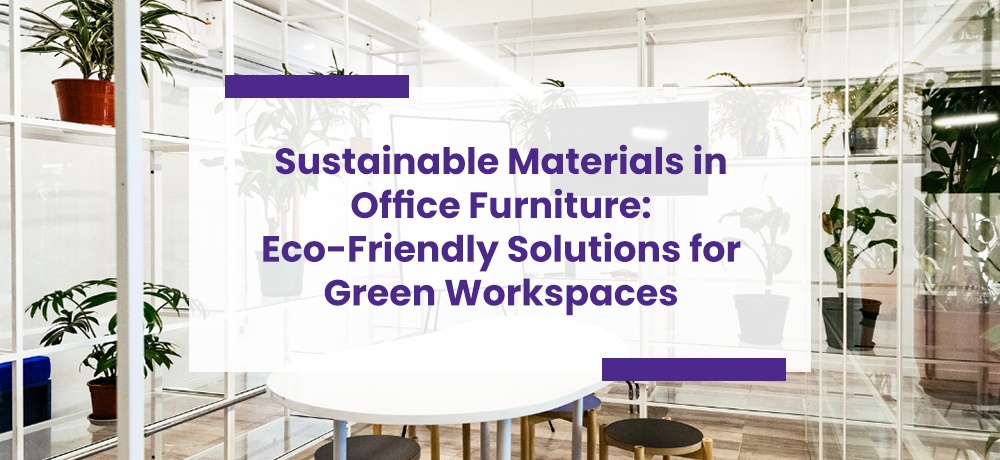Sustainable Materials in Office Furniture: Eco-Friendly Solutions for Green Workspaces

As the world becomes more conscious of the environmental impact of human activities, businesses are increasingly embracing sustainability initiatives to create a greener future. Office spaces, where employees spend a significant portion of their day, offer great potential for implementing eco-friendly practices. One key aspect of promoting sustainability in the workplace is the use of sustainable materials in office furniture. In this blog post, we will explore the significance of sustainable materials in office furniture and the eco-friendly solutions available for creating green workspaces.
1.) The Importance of Sustainable Materials:
Traditional office furniture often involves the use of non-renewable resources, harmful chemicals, and excessive energy during manufacturing processes. Sustainable materials, on the other hand, are sourced responsibly, have a reduced environmental impact, and promote circular economy principles. By choosing sustainable materials for office furniture, businesses can minimize their carbon footprint and contribute to conservation efforts.
2.) Responsibly Sourced Wood:
Wood is a popular material used in office furniture, and choosing responsibly sourced wood is a crucial step towards sustainability. Look for furniture made from wood certified by organizations like the Forest Stewardship Council (FSC), which ensures that the wood is harvested responsibly, promoting reforestation and biodiversity conservation. Additionally, consider reclaimed or recycled wood, which repurposes old materials and reduces the demand for new timber.
3.) Recycled Materials:
Recycled materials offer an excellent solution for eco-friendly office furniture. Manufacturers are increasingly incorporating recycled plastics, metals, and textiles into their products. Office chairs, desks, and storage units made from recycled materials not only reduce waste but also save energy and resources that would have been required to produce new materials.
4.) Sustainable Textiles:
The choice of upholstery and fabrics for office furniture can make a significant difference in sustainability efforts. Opt for textiles made from organic or recycled fibers, as they have a lower environmental impact compared to conventional materials. Eco-friendly textiles are often free from harmful chemicals, promoting healthier indoor air quality for employees.
5.) Renewable and Biodegradable Materials:
Incorporating renewable and biodegradable materials in office furniture contributes to a circular economy. Materials such as bamboo, cork, and hemp are rapidly renewable and can be replenished quickly. These materials have minimal environmental impact and, when disposed of, naturally decompose without leaving harmful waste.
6.) Low VOC and Non-Toxic Finishes:
Office furniture finishes can release volatile organic compounds (VOCs) into the air, contributing to indoor air pollution. Opt for furniture with low VOC or non-toxic finishes, which not only benefit the environment but also promote the health and well-being of employees.
7.) Modular and Adaptable Design:
Choosing modular and adaptable office furniture designs helps to reduce waste and promotes long-term usability. Modular pieces can be reconfigured and repurposed as office needs change, minimizing the need for new furniture purchases and extending the lifespan of existing pieces.
8.) Energy-Efficient Manufacturing:
Consider furniture manufacturers that prioritize energy-efficient and sustainable manufacturing processes. Companies that implement renewable energy sources and utilize eco-friendly production methods further contribute to the sustainability of their products.
Sustainable materials in office furniture offer a path towards creating eco-friendly and green workspaces. By choosing responsibly sourced wood, incorporating recycled materials, opting for sustainable textiles, using renewable and biodegradable materials, selecting low VOC and non-toxic finishes, embracing modular and adaptable designs, and supporting energy-efficient manufacturing, businesses can significantly reduce their environmental impact. Investing in sustainable office furniture not only aligns with corporate sustainability goals but also fosters a sense of responsibility and environmental consciousness among employees. As more businesses prioritize sustainability, the collective effort towards a greener future gains momentum, ultimately contributing to a healthier planet for generations to come.